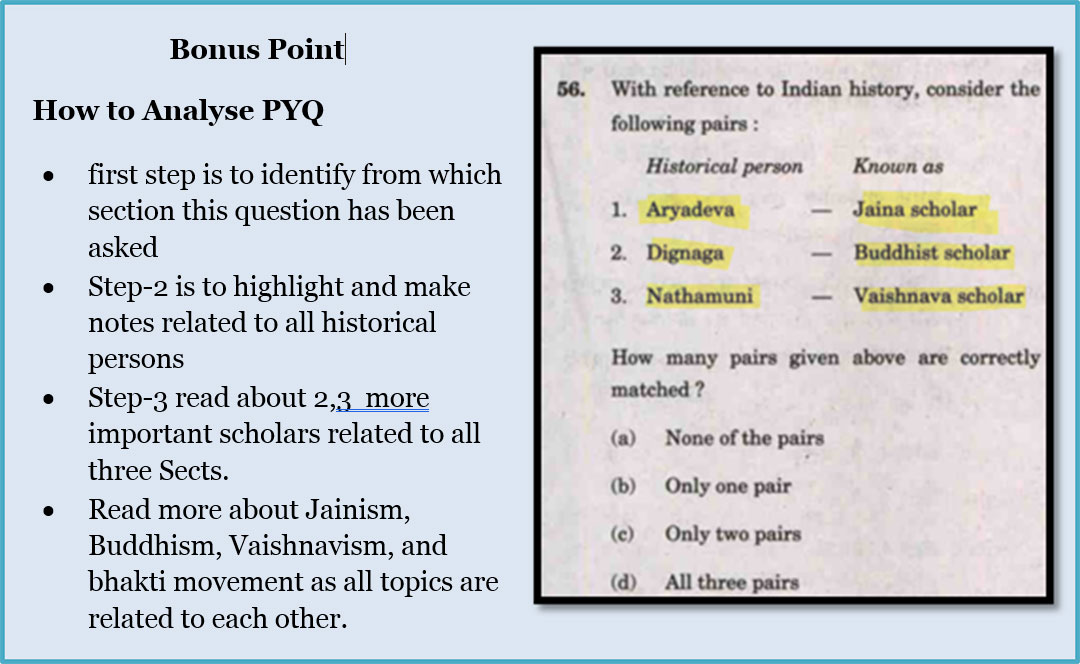For those who are willing to become IAS officer after 12th and if you just passed 12th class examination and now you want to be an IAS officer you are at very correct stage to start preparation for UPSC. After 12th you may not be eligible for the examination but it’s the perfect time to start preparation for UPSC- CSE. For appearing in examination one must know about some things before starting preparation such as: qualification, age limit, number of attempts, syllabus etc. UPSC after 12th takes some time because minimum qualification for appearing in examination is Graduation in any subject. And also minimum age for appearing in the examination is 21 years, so after 12th one can start preparation for the examination but cannot apply for it.
Eligibility:
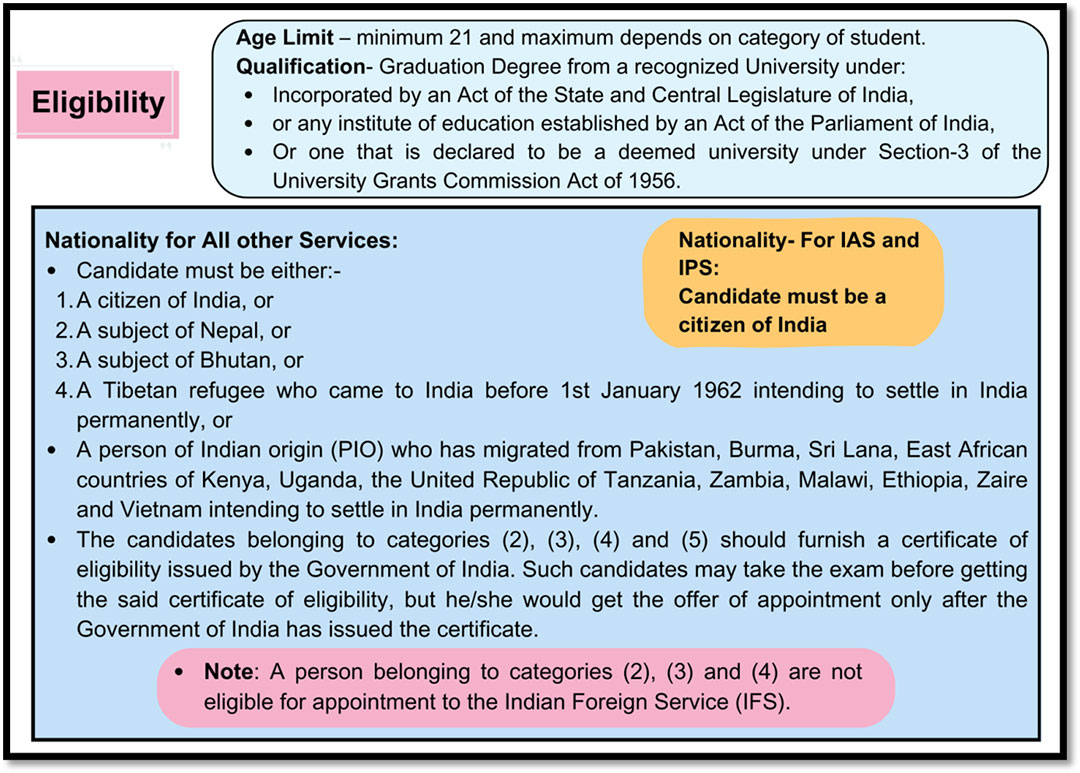
Therefore it is necessary to join a college and complete graduation and thereafter apply for the Civil services Examination.
UPSC Civil Services Examination
Before entering for the preparation of UPSC exam after 12th one must know all about the Examination which Includes syllabus, exam pattern and analyses of previous year questions, as well as what is the exam pattern. UPSC conducts this exam every year. UPSC CSE takes place in 3 stages (Prelims, Mains Examination and personality test).
Syllabus prelims
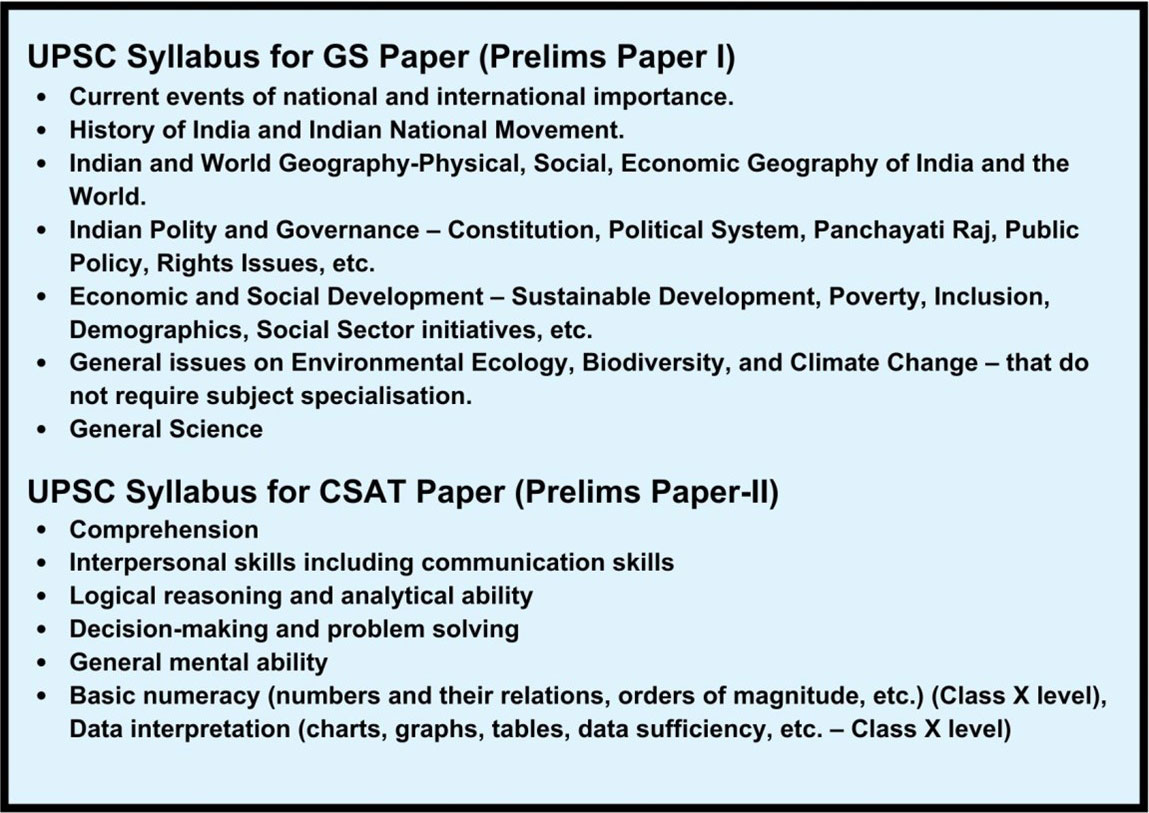
Exam Pattern & Trend in last 7 years
|
| Year |
HISTORY |
GEO. |
POLITY |
ECONOMY |
S&T |
ENV. |
CURRENT |
| 2023 |
14 |
16 |
15 |
14 |
12 |
14 |
15 |
| 2022 |
14 |
16 |
15 |
14 |
12 |
14 |
15 |
| 2021 |
10 |
10 |
11 |
16 |
14 |
17 |
17 |
| 2020 |
20 |
10 |
17 |
15 |
10 |
10 |
8 |
| 2019 |
17 |
14 |
15 |
14 |
7 |
11 |
22 |
| 2018 |
22 |
10 |
13 |
18 |
10 |
13 |
14 |
| 2017 |
14 |
9 |
22 |
16 |
9 |
15 |
15 |
What should be the strategy to be an IAS officer after 12th class.?
For UPSC preparation after 12th one must enrol in any graduation programme to fulfil the eligibility criteria and thereafter he /she must be mentally prepared for the UPSC examination. We will go Step by Step to understand what to study, how to study and how much to study. To become an IAS officer after 12th, first know your exam well. Now we will look up on the strategy to prepare for UPSC after 12th.
1. Know your Exam
- Have complete details of the examination as it is an important step towards preparation for class 12th students.
- As the syllabus is the most important part of the exam, one must always have in mind every point mentioned by UPSC in its syllabus during studies.
- Make an understanding based on the syllabus.
- Make your own separate list of topics based on syllabus to cover apart from your college classes.
2. Current affairs
- Every student has so much confusion regarding current affairs, that which news is important and which one is not. For the students who are starting their UPSC journey after 12th it may seem to them as a difficult task but for every problem there is a predetermined solution and for current affairs related confusion UPSC has provided syllabus for the civil services examination.
- Events which are relatable to syllabus and those which are mentioned directly in the syllabus are important topics to be covered fr4om the newspapers.
- Newspaper reading not only helps in current affairs, it is also useful for CSAT’s comprehension part.
- Apart from newspapers for current affairs students can check websites like PIB, Official sites of government of India, UN, WHO, IMF, World Bank etc.
- Magazines are also a good Option for students who are preparing for UPSC after 12th class. Some of the magazines are: Yojana, Kurukshetra, Down to Earth etc.
3. Choose your subjects for graduation wisely
- Choosing subjects is an important step for after class 12th to prepare for UPSC
- Subjects like History, Political Science, Geography, Public Administration, sociology, economics etc.
- Syllabus of these subjects overlap with UPSC CSE’s syllabus.
- This will help you in your optional exam as well as the General studies exam.
- Choosing your subject is very important for you to start your preparation after 12th class.
- Here is a list of subjects offered by UPSC as Optional Subjects, which students can opt in their graduation as well which will help them in their preparation for UPSC exam.

4. Reading NCERT books
- Just after completing 12th is the best time to start preparation for UPSC because it’s the time when you are in a process of learning, you’re memorising power, understanding, and not much distraction in life.
- Before reading any of the basic books for UPSC one must go through NCERT books from class 6th to 12th for a strong foundation.
- NCERT provides a basic understanding of the subjects to make your preparation easy after 12th.
- Here is list of NCERTs:
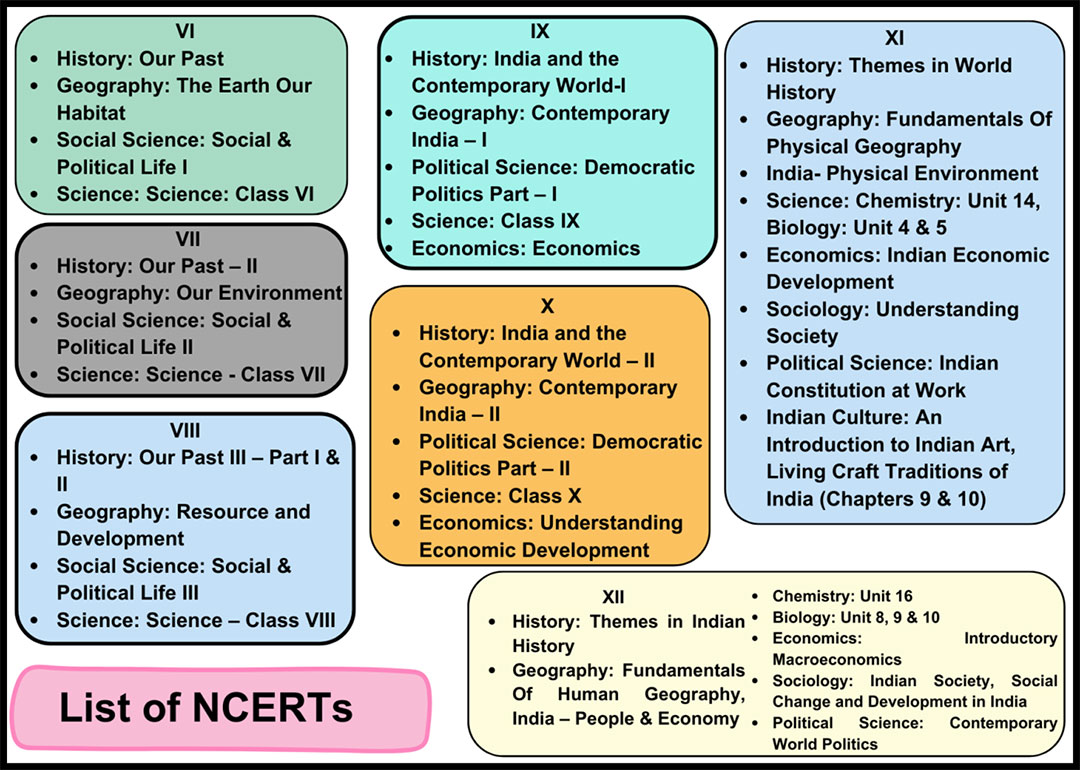
5. Start reading basic books
- After NCERTs students can shift towards the Basic books which can help to boost preparation of students who have started preparation for UPSC after 12th.
- With the help of NCERTs you will have a clear understanding of the subject matter. These books are considered as part of UPSC preparation and every student preparing for UPSC must have heard of these books.
- Some of the books are: M Laxmikant’s Indian Polity, GC Leong’s Physical and Human Geography, Oxford student Atlas for mapping, history of Medieval India by Satish Chandra, modern India by Bipin Chandra, Ancient India by RS Sharma, spectrum etc.
- These books will help in concept building and build a strong way towards the examination.
6. Introduce yourself to previous year Questions
- Previous year question as important as syllabus is for UPSC preparation after 12th
- PYQ’s help in identifying the important topics and the frequently asked topics in the examination.
- Identifying these may help students who are preparing after 12th for the UPSC CSE at the time they will appear in the examination.
- Sometimes if you are lucky enough you see the similar question in the exam from the PYQs.
- PYQs are easily available on UPSC’s website, one can download it from there.
7. Start writing Answers
- By the time you have completed the NCERTs and reading basic books you must start writing answers.
- First you can try writing answers to the questions framed by you at initial stages and thereafter start practicing PYQs for the Mains examination.
- PYQs are easily available on UPSC’s website, one can download it from there.
How to write an answer
- Understand the demand of question
- Identify the key words.
- Write a required introduction for your answer.
- Frame your answer
- Try to give your answer in precise and demanded form.
- Keep in mind the word limit for your answer.
- Support your answer with facts and data.
- Give a conclusion to your answer and suggest progressive ideas in conclusion.
Marks of Mains examination area included in the final examination below you can see the importance of mains examination.
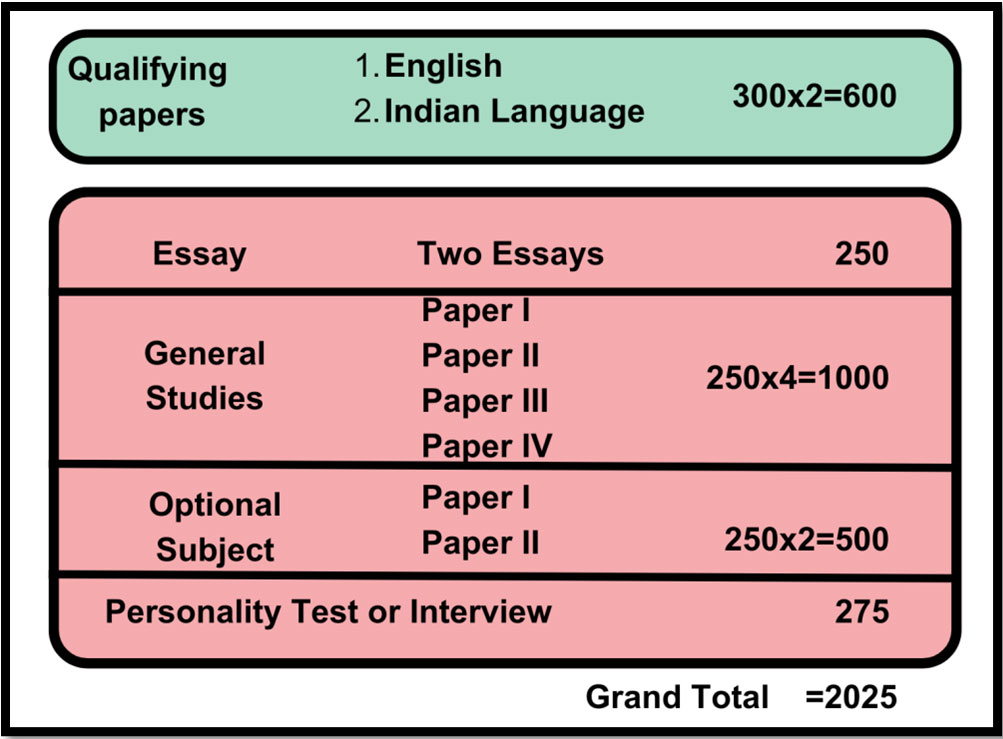
8. Attempt PYQs or Mocks
- Test yourself by attempting mock tests or previous year questions.
- This is an important practice for students preparing for UPSC after 12th.
- Gets PYQs from year 2011 to 2023.
- Have a SWOT analysis of your test paper and try to find out where you are lagging and how you can improve for next time
- Identify your weak subjects where you are lagging behind and work on them.
9. CSAT
- As CSAT is a qualifying exam in prelims it does not impact your final result but don't take it so casually if you failed in CSAT, your score in GS doesn't matter.
- Most of the students do this mistake that starts their preparation after 12th.
- Improve your comprehension skills with the help of newspapers. Try to learn new words for better understanding of passages.
- As a student who just started preparation just after 12th you have so much time to work on CSAT. Dedicate a time slot for CSAT in a week.
- Do practice some maths and reasoning questions from previous year question papers. For more conceptual clarity in maths and reasoning you can read quantitative and qualitative aptitude by R.S Aggarwal.
10. Essay writingT
- When you get used to of answer writing start writing essays.
- Essay can help you in improving your final score in the selection list. Good essay marks are important for improvement in your rank in UPSC CSE examination.
- Try to identify social issues from the newspapers and write essays on it.
- For more you can make a list of topics asked by UPSC in the essay examination and try to write essays on them.
How to write an essay?
At the initial stage take a rough paper and brainstorm for the points you must include in the essay and then make a structure or an order to write the essay and start writing on it. At the initial stage it may take up to 10-15 min but try to improve and bring it to 2-3 minutes.
Things to be included:
- Quotes; quote some famous personalities, reformers and institutions related to your topic.
- Facts: put some facts, data from authentic sources.
- Arguments supported by some references.
- Add value points
Syllabus for General Studies in mains Exam
Syllabus for UPSC Mains GS-1
- Indian culture will cover the salient aspects of Art Forms, literature and Architecture from ancient to modern times.
- Modern Indian history from about the middle of the eighteenth century until the present - significant events, personalities, issues.
- The Freedom Struggle its various stages and important contributors/contributions from different parts of the country.
- Post-independence consolidation and reorganization within the country.
- History of the world will include events from 18th century such as industrial revolution, world wars, re- drawal of national boundaries, colonization, decolonization, political philosophies like communism, capitalism, socialism etc.- their forms and effect on the society.
- Salient features of Indian Society, Diversity of India. • Role of women and women's organization, population and associated issues, poverty and developmental issues, urbanization, their problems and remedies.
- Effects of globalization on Indian society.
- Social empowerment, communalism, regionalism & secularism.
- Salient features of world's physical geography.
- Distribution of key natural resources across the world (including South Asia and the Indian sub-continent); factors responsible for the location of primary, secondary, and tertiary sector industries in various parts of the world (including India).
- Important Geophysical phenomena such as earthquakes, Tsunami, Volcanic activity, cyclone. etc., geographical features and their location-changes in critical geographical features (including water-bodies and ice-caps) and in flora and fauna and the effects of such changes.
Syllabus for Mains GS-II
- Constitution of India-historical-historical underpinnings, evolution, features, amendments, significant provisions and basic structure.
- Functions and responsibilities of the Union and the States, issues and challenges pertaining to the federal structure, devolution of powers and finances up to local levels and challenges therein.
- Separation of powers between various organs dispute redressal mechanisms and institutions.
- Comparison of the Indian constitutional scheme with that of other countries.
- Parliament and State legislatures-structure, functioning, conduct of business, powers & privileges and issues arising out of these.
- Structure, organization and functioning of the Executive and the Judiciary-Ministries and Departments of the Government; pressure groups and formal/informal associations and their role in the Polity.
- Salient features of the Representation of People's Act.
- Appointment to various Constitutional posts, powers, functions and responsibilities of various Constitutional Bodies.
- Statutory, regulatory and various various quasi-judicial bodies.
- Government policies and interventions for development in various sectors and issues arising out of their design and implementation.
- Development processes and the development industry-the role of NGOS, SHGs, various groups and associations, donors, charities, institutional and other stakeholders.
- Welfare schemes for vulnerable sections of the population by the Centre and States and the performance of these schemes; mechanisms, laws, institutions and Bodies constituted for the protection and betterment of these vulnerable sections.
- Issues relating to development and management of Social Sector/Services relating to Health, Education, Human Resources.
- Issues relating to poverty and hunger.
- Important aspects of governance, transparency and accountability, e-governance applications, models, successes, limitations, and potential; citizens charters, transparency & accountability and institutional and other measures.
- Role of civil services in a democracy.
- India and its neighbourhood-relations.
- Bilateral, regional and global groupings and agreements involving India and/or affecting India's interests.
- Effect of policies and politics of developed and developing countries on India's interests, Indian diaspora.
- Important International institutions, agencies and fora- their structure, mandate.
Syllabus for Mains GS-III
- Indian Economy and issues relating to planning, mobilization, of resources, growth, development and employment.
- Inclusive growth and issues arising from it.
- Government Budgeting.
- Major crops-cropping patterns in various parts of the country, different types of irrigation and irrigation systems storage, transport and marketing of agricultural produce and issues and related constraints; e-technology in the aid of farmers.
- Issues related to direct and indirect farm subsidies and minimum support prices; Public Distribution System- objectives, functioning, limitations, revamping; issues of buffer stocks and food security; Technology missions; economics of animal-rearing.
- Food processing and related industries in India- scope' and significance, location, upstream and downstream requirements, supply chain management.
- Land reforms in India.
- Effects of liberalization on the economy, changes in industrial policy and their effects on industrial growth.
- Infrastructure: Energy, Ports, Roads, Airports, Railways etc.
- Investment models.
- Science and Technology- developments and their applications and effects in everyday life.
- Achievements of Indians in science & technology; indigenization of technology and developing new technology.
- Awareness in the fields of IT, Space, Computers, robotics, nano-technology, bio-technology and issues relating to intellectual property rights.
- Conservation, environmental pollution and degradation, environmental impact assessment.
- Disaster and disaster management.
- Linkages between development and spread of extremism.
- Role of external state and non-state actors in creating challenges to internal security.
- Challenges to internal security security through communication networks, role of media and social networking sites in internal security challenges, basics of cyber security; money- laundering and its prevention.
- Security challenges and their management in border areas - linkages of organized crime with terrorism.
- Various Security forces and agencies and their mandate.
Syllabus for Mains GS-IV
- Ethics and Human Interface: Essence, determinants and consequences of Ethics in-human actions; dimensions of ethics; ethics in private and public relationships. Human Values - lessons from the lives and teachings of great leaders, reformers and administrators; role of family society and educational institutions in inculcating values.
- Attitude: content, structure, function; its influence and relation with thought and behaviour; moral and political attitudes; social influence and persuasion.
- Aptitude and foundational values for Civil Service, integrity, impartiality and non-partisanship, objectivity, dedication to public service, empathy, tolerance and compassion towards the weaker sections.
- Emotional intelligence-concepts, and their utilities and application in administration and governance.
- Contributions of moral thinkers and philosophers from India and the world.
- Public/Civil service values and Ethics in Public administration: Status and problems; ethical concerns and dilemmas in government and private institutions; laws, rules, regulations and conscience as sources of ethical guidance; accountability and ethical governance; strengthening of ethical and moral values in governance; ethical issues in international relations and funding; corporate governance.
- Probity in Governance: Concept of public service; Philosophical basis of governance and probity; Information sharing and transparency in government, Right to Information, Codes of Ethics, Codes of Conduct, Citizen's Charters, Work culture, Quality of service delivery, Utilization of public funds, challenges of corruption. • Case Studies on the above issues.
